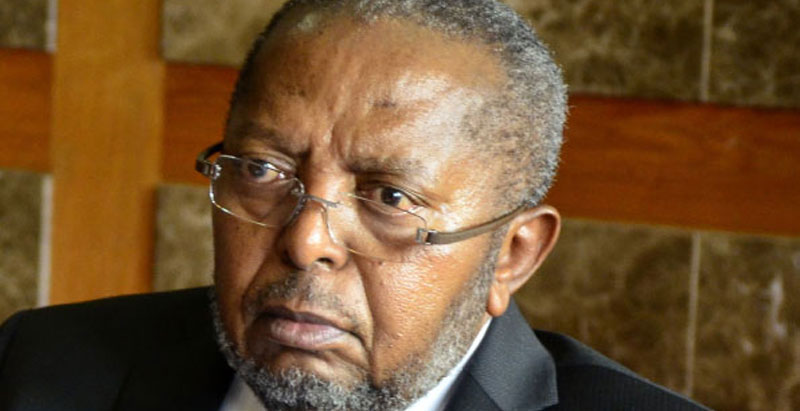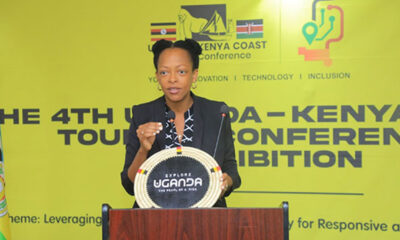Analysis
Will Constitutional Article 162 save Mutebile again?
Mutebile has always used this constitutional article in the same way a drunkard uses light poles; for support instead of illumination!

Central Bank Boss Tumusiime Mutebile
Forget about Museveni versus Besigye, Musisi versus Lukwago, or Kayihura versus Tumukunde. The big fight in town is between two technocrats – Irene Muryagonja and Emmanuel Tumusiime Mutebile.
The Inspector General of Government (IGG) is daring a man who for years has positioned himself as untouchable, omnipotent, a super Governor of Uganda’s central bank.
For the 17 years Mutebile has led the Bank of Uganda (BoU), he has been a force to be reckoned with. The gravity of his influence is evident for anyone who opens any literature about Uganda’s economy for the past 30 years.
Few bosses have enjoyed their job. Few bosses have been lucky to retain their job after committing not quite minor mistakes.
In June 2011, Mutebile told The Financial Times’ Katrina Manson that government had raided the treasury and took off with $720m (Shs.2.5 trillion), about two months of the country’s reserves then, to purchase fighter jets.
Although Mutebile later denied having let out government secrets to the media, the damage was irreparable. His utterances, which bordered recklessness, drove the shilling to a record low as speculators seized the moment. Needless to say Mutebile’s appointing authority was very angry with him. But somehow he survived the storm.
Five months later, in November 2011, Ugandans learnt that businessman Hassan Basajjabalaba had been irregularly offered Shs. 142 billion as compensation for three markets that government had taken away from him to avert a political crisis in Kampala. A Parliamentary investigation unearthed a big fraud involving not only senior government officials, including ministers, but also Mutebile.
Genesis of Article 162
Parliament demanded for his resignation for his role in the fraud. Mutebile, typical of him, faced the cameras and roared, “Only God can take me out of this chair.” He pointed the legislators to Article 162 (2) of the Constitution. Other officials involved in the scandal were sacked, Mutebile survived.
The Article 162 (2) of Uganda’s Constitution states thus, “In performing its functions, the Bank of Uganda shall conform to this Constitution but shall not be subject to the direction or control of any person or authority.”
The framers of this law wanted to grant the BoU semi-autonomy to shield the bank from undue political pressure. In the past the BoU had been pressured by politicians and military rulers to print money that was not backed up by production. This was one of the main causes of the runaway inflation Uganda experienced in the 1970s and 1980s.
To alleviate this problem the BoU was granted semi-independence. This was done through three key legislations: (i) the 1993 Bank of Uganda Statute (later the Bank of Uganda Act) which gave the bank full authority over monetary policy; (ii) the 1993 Financial Institutions Statute which gave the bank power to regulate and supervise commercial banks and other financial institutions; and (iii) the Article 162 (2) of the Constitution.
Through these reforms, the BoU was transformed from a ‘printing press’ to a credible central bank and helped to restore monetary discipline. Mutebile has been instrumental in guarding and uplifting the sanctity of the BoU.
Who polices the policeman?
However, in the course of doing this, Mutebile has used Article 162 (2) in the same way a drunkard uses light poles; for support instead of illumination. And it has served him well. He has always reached home!
My considered view is that by using the laws that were meant to protect the Bank of Uganda’s sanctity to defend his own mistakes, Mutebile might end up inviting stakeholders to have a second look at these laws. This won’t be good for the bank, going forward.
In his book, “Advancing the Ugandan Economy,” Dr. Ezra Suruma – a former Deputy Governor of BoU – writes, “[Although] it was desirable to protect the central bank from being directed to print money as General Amin had done in 1972, it was [equally] essential that the bank itself be accountable to the public for its activities.”
He goes ahead and states that the drafters of the law – headed by Prof. George Kanyeihamba – left the BOU “virtually accountable to no one.” The Governor reports to the board of directors, of which he also is the chairman. So in effect he reports to himself.
The board, although appointed by the President through the Minister of Finance, does not report to the minister, the president, or the parliament. The late Chris Kassami, former Secretary to the Treasury, once asked, “Who polices the policeman of Uganda’s financial sector?”
Mutebile’s contribution
Mutebile’s recent outbursts with IGG have attracted more scrutiny into BoU’s independence. I think this is not a good development as far as the future of the bank and the economy, generally, is concerned.
When I read headlines in local media such as “IGG to probe Mutebile’s wealth,” (New Vision of Wednesday, March 28, 2018), I felt bad. I felt bad because Mutebile should be the last man to be humiliated, even if the humiliation was to stop at a newspaper headline.
Those familiar with power define the powerful as people with unquestioned honesty, integrity, character and humility. Mutebile might be on the way to losing some of these traits. Yet his contribution to this country’s economy and thus its well-being in the past three decades should never be questioned by anyone with the four abovementioned traits.
It is Mutebile who in 1987, together with a few of his colleagues at the then Ministry of Planning and some expatriates, authored the famous Economic Recovery Programme (ERP) that marked the beginning of the emergence of the Ugandan economy we are witnessing today.
At the time the Mutebiles authored this program, inflation had reached 358.4%, poverty was at 56.7% and the GDP growth of 1.1% was largely driven by the subsistence sector.
Mutebile’s weaknesses
It is Mutebile who led the team of reformers that restored both fiscal and monetary discipline; agitated for liberalisation of economy, and other critical contribution that led to the resurgence of our economy.
However, as I wrote in these pages seven years ago, the embattled Governor made a mistake of overstaying his invitation. The past seven years clearly attest to this fact.
Apart from running out of ideas to manage an economy that is out of the reform phase, Mutebile also seemed to me to have run out of control and confidence of some of his staff at the bank. There seems to be an ideological cold war at BoU between Mutebile and other long-serving staff of the bank. The latter group rightly believes that Mutebile is still frozen in the past; agitating for policies and economic ideologies which are not in sync with today’s economic realities.
Undoubtedly BoU is in dire need of a leadership better suited to guide the post-reform economy into take-off. Like I have written in these pages before, the sooner those responsible prepared a post-Mutebile BoU the better.
The essence of power
Physically, the big man clearly looks weak and frail. I think now he is fit for playing just an advisory role to the bank. In any case, being a market fundamentalist I don’t think Mutebile still has a major role to play in an economy that has embarked on second generation reforms.
Eight years ago, Uganda returned to long term planning. Mutebile does not subscribe to planning. The country has reverted to active industrial policy through reopening the Uganda Development Corporation. He does not support that either. Recently, cabinet passed inward-looking policies such as “Buy Uganda Build Uganda” (BUBU) and local content policy. Clearly the state is slowly getting back into the economy.
Mutebile is allergic to all these. He has over the years been consistently saying, “Government has no business in doing business.” So, what is he still doing with a government that has gone back into doing business?
Recently, Chris Dessi wrote about “A thesis on the essence of power”. He said, “The only absolute way to be the most powerful person in the room is this: Rid yourself of the need to be the most powerful person in the room.” One of those ways? Get out of the room at the right time.
Comments



























